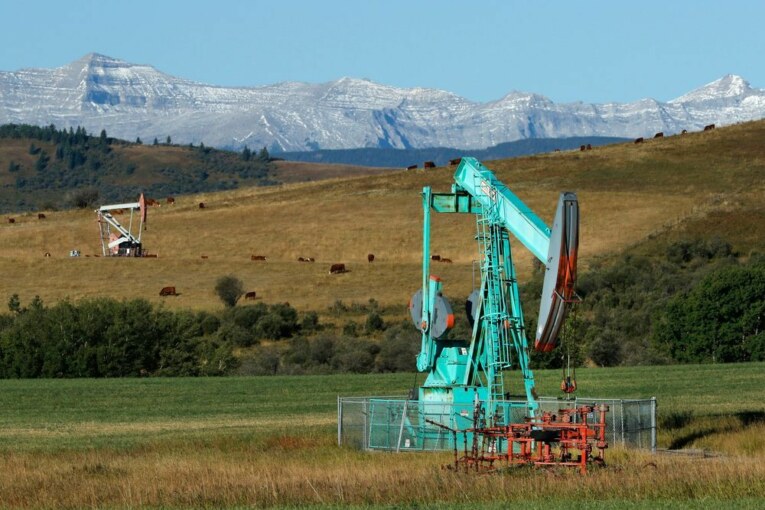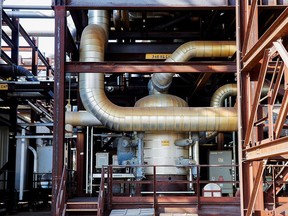
A new report examining the different paths to reach net-zero emissions indicates Canada isn’t on track to reach its final destination by 2050 — and it finds there’s a huge price to pay if the country decides to phase out oil and gas production to get there.
In fact, the additional economic consequences could be as much as $100 billion in lost GDP by 2050, with Alberta shouldering the brunt — about $60 billion — if oil and gas production is phased out in that period, says the study for the Public Policy Forum, an independent, non-profit organization.
“The cost of achieving net-zero emissions in Canada is uncertain and is not felt equally across all regions,” the report states.
Those points might seem self-evident, but it’s the nitty-gritty details on the potential economic costs and how they are allocated — or avoided — that’s worth paying attention to, particularly for an energy-producing province like Alberta.
The study, to be released Thursday, was based on an analysis by Vancouver-based Navius Research, which the forum commissioned to examine the economic implications of heading down the different routes.
“Nobody’s debating net zero. We are long past that. It’s what is the better way and what is the worst way to get to net zero in a democracy?” said forum CEO Edward Greenspon.
“One of the major findings of Navius’ work is that there are higher or lesser economic costs to pay in reaching net zero, depending on which of these paths you follow.”
The group compared two ways to reach net-zero emissions in Canada. One focused on current policies, along with a cap at net-zero emissions throughout the economy in 2050. The other scenario included gradually phasing out fossil fuel production, beginning in 2035.
In his preface to the report, Greenspon pointed out that “an accelerated phaseout introduces economic pain with no added environmental gain.”
With the oil and gas phaseout, Canada’s economy would grow at a clip that is 0.1 per cent slower annually than the other scenario, the study found.
“Both pathways arrive at net zero but with unequal economic impacts along the way,” Greenspon wrote.
“This apparently small difference compounds over time, leading to $100-billion excess lost GDP in 2050, a three per cent contraction of the overall economy. This essentially amounts to a deep recession without a recovery ever materializing.”
Recommended from Editorial
-

Varcoe: Alberta finally gets on net-zero train, but ‘aspirational’ plan needs detail
-

Varcoe: Canada pushes ahead on carbon capture projects, but still awaits green lights
-

Cost of carbon emissions nearly five times higher than previously thought: analysis
The study also indicates the country is not on track to achieve net-zero emissions under currently announced policies.
Policies in the federal emissions reduction plan are projected to reduce emissions by 29 per cent by 2030 from current levels, it found. The Trudeau government aims to lower GHG levels by 40 to 45 per cent by 2030.
“It is clear, however, that greater policy stringency is required to achieve net-zero emissions by 2050 in Canada.”
So how does the country get there?
For the world’s fourth-largest oil producer and fifth-largest natural gas producer, this debate has major ramifications. The industry is striving to decarbonize amid growing public concerns surrounding climate change.
The oil and gas sector is the largest emitting industry in the country, responsible for 28 per cent of all greenhouse gas emissions in 2021. Emissions per barrel have been falling in recent years and the country’s largest oilsands operators are working together to reach net-zero by 2050.
The Pathways Alliance group is examining different technologies to reach the goal, including developing a carbon capture, utilization and storage (CCUS) network, using solvents in thermal production and studying direct air capture.
The report said getting to net zero presents a “significant challenge for the growth of Canada’s economy.” The sector-agnostic plan (without a phaseout) could decrease GDP in the country by $196 billion in 2050, compared with announced policies.
In Alberta, the impact of such a scenario would be $60 billion in 2050. But a policy designed to phase out oil and gas production would increase the economic impact by another $60 billion — and $100 billion in the country.
“The province experiences minuscule growth of less than one per cent for the 30 years from 2020 to 2050, according to the model. If anything, Navius expects its assumptions may actually be underestimating the severity of this impact,” Greenspon wrote in the preface.
Given the size of the sector and its importance in supplying the world with global energy, it would also undercut Canada’s exports and trade balance.
However, the study cautions there is “significant uncertainty” about the impact of net-zero policy on the oil and gas industry when considering various price sensitivity scenarios. (Its GDP impact assumes an intermediate oil price, averaging around US$64 a barrel through the period.)

Greenspon said the forum decided to look at the two options to examine the potential economic implications for the country and to better inform debate.
Ottawa isn’t calling for a complete phaseout of oil and gas production; it’s created a CCUS investment tax credit that would help decarbonize the sector. It is also moving forward on an emissions cap for the industry, while some groups are advocating for other policies that would lower production.
The report notes its modelling makes a number of assumptions and the economic impact depends on future oil prices, the costs tied to CCUS and the availability of direct air capture technology. It states CCUS and direct air capture are “crucial to minimize the cost of achieving net-zero emissions.”
Keith Stewart of Greenpeace Canada said any assumptions around the future cost of removing carbon from the atmosphere and other evolving technologies remain uncertain.
“If you’re going to get to net zero by 2050, you basically have to get rid of all fossil fuels,” he said.
“Do you want to roll the dice on the kinds of carbon removal technology becoming really cheap, really fast, and scaling incredibly quickly?”
Former Bank of Canada governor David Dodge, who provided feedback on the study, said it was well done, particularly given the 30-year timeline it examined and the assumptions necessary for such modelling.
“They found that indeed there was a significant cost of imposing — and I’m using my words — the premature cap on the output of oil and gas,” Dodge said.
“You shouldn’t try to deal with that path by imposing particular milestones, if you will, on individual sectors of the economy as they adjust. That is undoubtedly the more expensive way to make the adjustment to net-zero . . . The oil and gas sector will have to adjust, they will indeed invest in carbon capture and other technologies along the way.
“So, it’s not that they don’t have to make the change, but they will do it in the way that is, in fact, least disruptive.”
Chris Varcoe is a Calgary Herald columnist.
You can read more of the news on source
